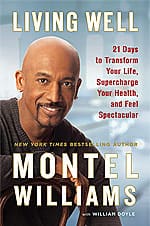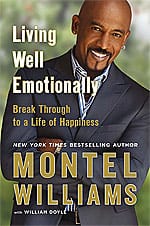Life Extension Magazine®
No one, absolutely no one, tells Montel Williams what to do. Not even a doctor. And especially not a doctor who tells him he has multiple sclerosis (MS) and should start preparing to die. It’s about 10 years since Williams, 52, received his diagnosis of MS. In that time, he has not only transformed his life with the use of supplements, replacement hormones, a healthy diet, exercise, and spiritual practices, he also continues to lead an exceptionally active life. Williams is truly a role model not only for those with MS, but for anyone facing a serious illness or health problem. His method in a nutshell: inform yourself and fight back! In the process, Williams, a renowned Emmy award-winning talk show host for 17 years, has expanded his career to become an author, health care advocate, and living example of what being your own person can accomplish. His new book, Living Well Emotionally (New American Library, 2009), a follow-up to the earlier best-selling Living Well, explores the powerful connection between mind and body, pointing the way to a more positive, healthy lifestyle. “The Worst Day of My Life”In an interview with Life Extension magazine, Williams talks about what he calls the “worst day of my life,” the day in 1999 when he received the MS diagnosis. “The doctor looked me in the face,” recalls Williams, “And said that I’d probably be in a wheelchair in less than three years and that I should stop working, give up exercise and everything stressful in my life because, as he put it, ‘You just have to face it, my pal, this is what you will be like.’ I almost smacked him in the face!”
But Williams is a man with a sharp mind, strong will, and inquisitive nature who, after this initial shock, began to analyze the situation. It struck him that even though the doctor barely knew him, he presumed he could readily outline the rest of his patient’s life. “So I went out to learn everything I could about my illness,” says Williams. “I started seeing doctors all over the world, from one of the foremost experts on MS at the Karolinska Institute in Sweden to experts at Harvard and Johns Hopkins Medical Schools.” Today, Williams has a team of doctors he trusts and works with, but emphasizes that he is still very much in charge. “I realized that I alone am responsible for my health,” Williams explains, “And as much as we like to believe that doctors know everything, they don’t. We are responsible for knowing as much about what’s going on in us as any doctor.” Williams also recognized that he had probably been having MS symptoms for 20 years without realizing it and without ever receiving a proper diagnosis. As a decorated former naval intelligence officer, Williams, a graduate of the Naval Academy, remembers being one of a hundred men who received a faulty diphtheria-typhoid shot in 1980 that accidentally gave him 20 to 30 times the prescribed dose. “I became immediately sick,” he says, “And was taken to the hospital. I went blind in my left eye and was spastic in my left leg,” but none of the doctors suspected MS, which at that time was thought to be mainly a disease of Caucasian women over 30. His symptoms abated, but over the next two decades, Williams continued to experience bouts of pain, weakness, twitching, and vision problems, none of which was ever correctly diagnosed. Today, it is known that an estimated 250,000 to 350,000 Americans have MS, most who are diagnosed between the ages of 20 and 40. But it is still unknown whether the shot Williams received is directly connected to his condition. A Plan For Optimal HealthWilliams describes his health regimen as a “Life Extension-type program.” It includes a menu of carefully chosen supplements, replacement hormones, a diet rich in fruits and vegetables, a vigorous exercise program, and daily conscious efforts to cultivate positive thoughts and actions. The results have been just short of miraculous.
“I happen to supplement,” explains Williams, “Because I have learned that there are supplements I need to balance my body. There is enough anecdotal and written material out there about the effects of some on neurological disease, so I’m going to take them.” Williams’ supplements include vitamin D3, magnesium, DHEA, vitamin B12, iron, zinc, aloe vera, pregnenolone, DHA, and DIM. “I’ve been on this supplement regimen for about nine years,” Williams says, “And I feel good. Whenever necessary, I adjust it, I tweak it, I’m constantly looking for ways to make it better.” His program includes blood tests every 45 to 90 days to determine nutrient levels; he and his doctor make changes when warranted. Williams also takes two daily hormonal replacement shots, along with a third shot of a costly prescription medication he feels is helping him. “I’ve decided to make sure that my arsenal is full with every type of weapon I can use to fight this war,” he explains, adding that he would prefer to avoid medication, but feels he needs this one right now. His supplement and hormonal programs are closely tied to the dramatic dietary changes Williams has made since his diagnosis. A typical junk food eater before MS, Williams is now meticulous about everything he puts into his body. He begins his day with a green drink, along with a mixture of various organic vegetables and fruits, including apples, oranges, carrots, spinach, kale, cantaloupe, broccoli, collard greens, and beets, that are rotated. He says the drink energizes and refreshes him, providing antioxidants, phytochemicals, fiber, flavonoids, and polyphenols that reduce chronic disease and make you feel “spectacular.” Around 1990, Williams began dietary changes when a teacher told him that he was “eating garbage,” and then taught him how to eat for better health. A serious bodybuilder at the time, Williams continued eating this way when he experienced positive results. Before long, he had given up white flour, sugar, table salt, and red meat, and switched to whole grain bread and cereal, salad, fish, and olive oil. After 1999, Williams adds, “I fell in love with raw foods,” discovering that they relieved the often profound depression that had set in after his diagnosis. But as with everything in his life, Williams’ diet is a work in progress and today, he says, “I am on a diet that is 60 to 65% liquified, emulsified food and 25% cooked food. I’ve added a lot of raw foods and a lot of high antioxidant foods. And here I am, 52 years old, I have MS, I’m walking, I’m thriving, I’m working every day, and I believe that this is what does it for me.”
Williams has been “an exercise junkie” for much of his life, and it was his strenuous exercise program that doctors often blamed for what he now believes were MS symptoms. “I was a kind of bodybuilder,” he explains, “A very big weightlifter, and I weighed about 230 pounds for a while and used to squat around 520 pounds. So when I saw a doctor and talked about nerve problems, he would look at me and say, ‘Well, look at all the weight you’re lifting. That’s what’s wrong with you,’ and he would write it off to that, so I did, too.” Today, Williams starts off his day with 60 to 90 minutes in the gym. He lifts weights, rides a stationary bike, swims, runs, does martial arts, and most recently, has become devoted to snowboarding. Combined with supplements and diet, he says, “The result is that I’ve transformed my body and rejuvenated my spirit, and I now perform at a much higher level of intensity in all areas of my life.” He also states that, “The right dietary pattern combined with exercise is a potent, powerful disease fighter,” citing what he claims, “Could be the most important article you’ll ever read:” “Effects of exercise and diet on chronic disease,” by Christian K. Roberts, PhD and R. James Barnard, PhD published in a 2005 issue of the Journal of Applied Physiology and available online. Finally, Williams credits his efforts to change his thinking as an essential part of his battle to stay well. Although he uses a 21-day program of change in his books, Williams says studies show it takes only 17 days to change a habit, even one that is deeply ingrained. “You can change a habit in your brain,” Williams points out, “And start to change the way you think negatively and turn that to thinking positively.” His desire to share the dramatic results of his own changed thinking led to his current book, Living Well Emotionally. His theme: “You create your own happiness by how you think and what you do.” By nature, Williams is a talker, a man with a keen insight into people, and a powerful desire to help them live better lives. In this new book, his goal is to help people turn the American epidemic of depression and sadness into happiness and a positive outlook on life. “You are the master of your emotional destiny,” he observes, urging us to go beyond Freudian psychology to reap the benefits of cognitive therapy, an approach that involves changing your thinking and has been successful with many suffering from depression. Williams’ depression following his diagnosis is understandable—in fact, it’s hard to imagine anyone who would not be depressed facing such a difficult future. But Williams has found cognitive therapy a boon and says he makes strong conscious efforts every day to change any negative thoughts into positive ones. “Here’s what I do,” he says. “Every night before I go to sleep, I think about what I did that day that is worth talking about tomorrow. I think of three good things that I did. Like when I walked into a building and that woman rudely bumped into me, I didn’t react, I held the door for her and let her go in.” He also advocates keeping a gratitude journal in which you write down things you are grateful for every day. And he talks about making a “Gratitude visit, just walking up to friends and handing them a card or paper with 10 or 20 sentences telling them how much you appreciate them, thanking them for being a part of your life. Those little single things like that,” he says, “Are the things that make a person who would normally spiral into an abyss spiral back out.” But why is being nice to others good for your physical health? Because, says Williams, your emotions directly affect your body, negativity and stress weaken your immune system. “People can have a great day but if one negative thing happens, that’s what they focus on,” he says. And if you focus on negativity and carry that load around with you all the time, “It starts to affect everything from your heartbeat to your respiratory rate to your blood pressure,” he notes. The solution? Be kind, be compassionate, try to help others. “When you help somebody else, something is going to come back to you like you’d never believe,” says Williams. “I believe it, I live it, I feel it, I understand it. That’s what’s helping me walk, that’s what’s helping me battle the spasticity in my legs, that’s what’s helping me battle the twitching at night. Because the happier I am, the more I am emotionally free of stress and the better I deal with every aspect of my life.” Williams says his multifaceted program also enhances longevity and that he has felt a dramatic difference in the severity of his symptoms, with fewer bad days, less pain, and far more energy. | ||||
The American Medical SystemAs we’ve seen, Williams has been intensely involved in our medical system for the past decade and certainly has some strong views on the subject. His experiences with physicians, from his time in the military to his MS diagnosis 10 years ago, have been very disappointing. But after a determined search for the best possible medical care (which he can fortunately afford), Williams now feels that the partnership with his team of health professionals is helping him successfully contend with MS. “I have always believed in my ability to find my own answers,” Williams tells us. “One of the basic things in my life, a drive I’ve had since I was seven years old, has been my belief that I own the definition of who I am. No one else will define me. I will define me.” So when that first doctor tried to paint a dismal picture of his future with MS, Williams said his response was “How dare he try to define who I am? “We had better understand that we are responsible for our own medical care,” he continues, “Because as much as we love to put it in their hands and relegate and delegate our authority to doctors, we have to take authority and assume it and turn around and direct them.”
Williams has frequently encountered doctors who were not receptive to his program of supplements, hormone replacement, and diet. “Those who aren’t receptive don’t need to get my money,” he proclaims, adding that, “Whether we like it or not, medical care in our society is a capitalistically driven mechanism,” meaning all of us may have to go through a long list of doctors in order to find the right one for our needs. “Because,” says Williams, “If I don’t believe in my doctor and my doctor doesn’t believe in me, there’s no way he or she could possibly treat me.” Williams anticipates serious changes in health care delivery in the near future, especially with assuming greater control over the system. But he also feels positive about the greater interest among health professionals in a more holistic approach. “They’re doing it,” he remarks, “Because they’re starting to see the results.” Even so, progress can seem painfully slow at times. Williams mentions MS patients who were diagnosed at the same time he was who, when he sees them, are not doing well. “I see how they’re doing,” he says, “And I see how I’m doing and I’m glad I’m on this regimen.” But don’t they want to know what he’s doing? Don’t they want to do it, too? “All of them say, ‘My doctor told me I shouldn’t.’ So what can I say? Some people are afraid. When a doctor tells you, ‘That’s just snake oil,’ what are you supposed to think?” And what about the doctors, how do they respond? “The impression I get from the doctors who see me is ‘I don’t necessarily know if I would recommend this for my patients, but I look at you and I can’t tell you to stop.’” Current ProjectsFollowing his MS diagnosis, Williams created the Montel Williams MS Foundation (montelms.org) to help keep the public up-to-date on findings, provide support and inspiration for those with MS, and raise money to find a cure. Another project dear to his heart is the Partnership for Prescription Assistance (PPA) program, for which Williams has been a national spokesperson. Helping those in need obtain free medication with the assistance of participating drug companies, Williams is very proud of his contributions to this important cause, which has given away an estimated $10 billion in products.
When Williams’ long-running television talk show came to an end last year, he began work on many different projects, one of which is about to come to fruition. It’s a new kind of television he calls a “talkmercial.” “I’ve created a symbiotic merger between a talk show and an infomercial and it’s very exciting because it’s growing so quickly,” Williams explains. With his own distribution and syndication company, he hopes the one-hour show will be broadcast in prime time this spring. “We have an issue, a solution, and a product tied together,” he says, “So it means the advertising is integrated.” Williams is also a publisher, actor, film producer, and a powerful motivational speaker whose talents are widely in demand, especially in light of his achievements in his fight against MS, and his popular books about his life and discoveries regarding better health. It all goes back to his mantra of taking control of your life. “No matter how you’re living right now, no matter what your individual situation,” says Williams, “You can take charge and flourish in times of adversity.” Montel Williams is the living proof of the truth of these words. For more information on Montel Williams, check his website at www.montelwilliams.com |







